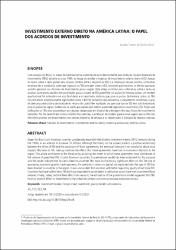Please use this identifier to cite or link to this item:
https://repositorio.ipea.gov.br/handle/11058/10779Full metadata record
| DC Field | Value | Language |
|---|---|---|
| dc.contributor.author | Araújo Júnior, Ignácio Tavares de | - |
| dc.coverage.spatial | América Latina | pt_BR |
| dc.coverage.spatial | Brasil | pt_BR |
| dc.date.accessioned | 2021-08-24T15:00:12Z | - |
| dc.date.available | 2021-08-24T15:00:12Z | - |
| dc.date.issued | 2021-04 | - |
| dc.identifier.uri | http://repositorio.ipea.gov.br/handle/11058/10779 | - |
| dc.description.abstract | Com exceção do Brasil, os países da América Latina aumentaram consideravelmente suas redes de tratados bilaterais de investimento (TBIs) durante os anos 1990, na busca de ampliar o ingresso de investimento externo direto (IED). Apesar da teoria sobre o tema prever uma relação positiva entre o ingresso de IED e a celebração desses acordos, a literatura empírica não é conclusiva sobre que impactos os TBIs exercem sobre o IED, tornando questionáveis os efeitos que esses acordos geraram nas decisões de investimento para a região. Este artigo contribui para a literatura sobre o tema ao analisar como esses acordos têm contribuído para o volume de IED greenfield nos países da América Latina. Um modelo gravitacional foi estimado com essa finalidade, e os resultados indicam que, para os países da América Latina, os TBIs não têm efeito estatisticamente significativo sobre o IED. Os tamanhos das economias, o crescimento econômico, o grau de abertura comercial e a similaridade do retorno do capital têm explicado por que esse tipo de IED tem sido direcionado para os países da região. Evidenciou-se ainda que países com melhor qualidade regulatória atraem mais IED. Países que ratificaram os TBIs mas responderam por alguma reclamação em tribunal de arbitragem têm seus fluxos de investimento reduzidos. Por fim, levando em conta os efeitos fixos setoriais, a estimação do modelo gravitacional sugeriu que os TBIs não têm efeito positivo em investimentos nos setores industrial, de serviços e os relacionados à extração de recursos naturais. | pt_BR |
| dc.language.iso | pt-BR | pt_BR |
| dc.publisher | Instituto de Pesquisa Econômica Aplicada (Ipea) | pt_BR |
| dc.title | Investimento externo direto na América Latina : o papel dos acordos de investimento | pt_BR |
| dc.type | Boletim de Economia e Política Internacional - Artigos | pt_BR |
| dc.rights.holder | Instituto de Pesquisa Econômica Aplicada (Ipea) | pt_BR |
| dc.source.urlsource | http://www.ipea.gov.br | pt_BR |
| dc.location.country | BR | pt_BR |
| dc.description.physical | p. 135-162 : il. | pt_BR |
| dc.subject.vcipea | IPEA::Finanças Públicas. Bancos. Relações Monetárias Internacionais::Moedas. Financiamento::Investimento::Investimentos | pt_BR |
| dc.subject.vcipea | IPEA::Cooperação Internacional. Relações Internacionais::Cooperação Internacional::Ajuda ao Desenvolvimento::Cooperação Internacional | pt_BR |
| dc.rights.license | É permitida a reprodução deste texto e dos dados nele contidos, desde que citada à fonte. Reproduções para fins comerciais são proibidas. | pt_BR |
| dc.subject.keyword | Tratados de investimentos | pt_BR |
| dc.subject.keyword | Investimento externo direto | pt_BR |
| dc.subject.keyword | Modelo gravitacional | pt_BR |
| dc.subject.keyword | tratados bilaterais de investimento (TBIs) | pt_BR |
| dc.relation.references | http://repositorio.ipea.gov.br/handle/11058/10748 | pt_BR |
| ipea.description.additionalinformation | Artigo publicado em: Boletim de Economia e Política Internacional (BEPI): n. 29, jan./abr. 2021. | pt_BR |
| ipea.description.additionalinformation | Possui referências bibliográficas. | pt_BR |
| ipea.access.type | Acesso Aberto | pt_BR |
| ipea.rights.type | Licença Comum | pt_BR |
| ipea.englishdescription.abstract | Except for Brazil, Latin American countries considerably expanded their bilateral investment treaties (BITs) networks during the 1990s, in an attempt to increase FDI inflows. Although the theory on the subject predicts a positive relationship between the inflow of FDI and the conclusion of these agreements, the empirical literature is not conclusive about what impacts TBIs have on FDI, making uncertain the effects that these agreements have had on investment decisions in the region. This article contributes to the literature by analyzing the extent to which these agreements have contributed to the volume of greenfield FDI in Latin American countries. A gravitational model has been estimated for this purpose and the results indicate that for Latin American countries TBIs have no statistically significant effect on FDI. The size of economies, economic growth, trade openness, the similarity in return on capital has explained why this type of FDI has been directed to countries in the region. It was also evident that countries with better regulatory quality attract more FDI. Countries that have ratified most TBI but have responded to some claims in arbitration courts have their investment flows reduced. Finally, taking sectoral fixed effects into account, the estimation of the gravitational model suggested that TBIs have no positive effect on investments in the industrial, services and natural resource extraction sectors. | pt_BR |
| ipea.researchfields | N/A | pt_BR |
| ipea.classification | Comércio Internacional | pt_BR |
| ipea.classification | Economia. Desenvolvimento Econômico | pt_BR |
| ipea.classification | Relações Internacionais | pt_BR |
| Appears in Collections: | Cooperação Internacional. Relações Internacionais: Artigos | |
Files in This Item:
| File | Description | Size | Format | |
|---|---|---|---|---|
| bepi_29_investimento.pdf | 1.02 MB | Adobe PDF |  View/Open |
Items in DSpace are protected by copyright, with all rights reserved, unless otherwise indicated.

